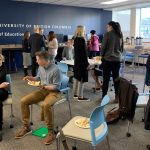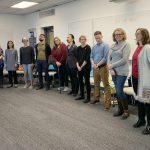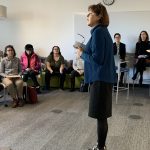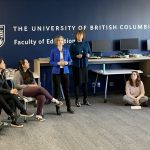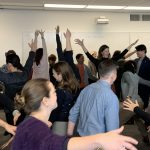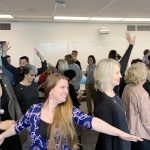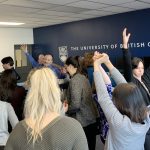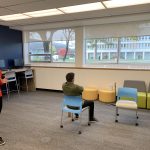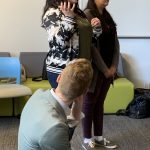An Exploration of Indigenous and SOGI-Representation on Campus
Our first Intensive on November 19th, 2020 was a success!
With around 40 participants in attendance—whose roles ranged from faculty, faculty advisors, teaching assistants, graduate students and staff—the room was filled with generative and thoughtful energy. During lunch, attendees and facilitators mingled and enjoying some light refreshments, becoming more comfortable with each other and the space in which the Intensive took place.
The following 2 hours were spent in creative exploration of the three presented scenarios, with participants debriefing and interacting in small group discussions after each. Participants shared their own lived experience and teaching expertise, which made this Intensive a first step towards transforming university classroom pedagogies in ways that signal productive inclusion while honouring the diversity of UBC students and pre-service teachers. Dr. Jan Hare and Dr. Wendy Carr welcomed everyone, acknowledging the Musqueam traditional territory, recognizing the contribution of the UBC Research Based Theatre Collaborative, and explaining both the intellectual and creative momentum behind the Intensive as well as the agenda for the afternoon.
The theatrical process guiding our November 19th Intensive began with some ice-breaker activities, including a quick round of introductions and moving into a free-flow exercise where folks were asked to move about the space at different speeds and by taking up more, and then less, space. This activity is both metaphorical and practical in the sense that certain identities more easily dominate classroom spaces depending on the varying intersections of privilege and oppression at work within any group.
After the warm-up, led by PhD candidates Amber Shilling and Christopher Cook, facilitators and members of the TIPP project’s Collective performed the first scenario, which explored the ways in which public statements made by students in university classrooms demand public responses from instructors. This scenario showcases the too-often attempted erasure of Indigenous students from settler-dominant classrooms as well as the responsibility of instructors to address harmful comments made during lectures in ways that acknowledge the violence being caused but avoid isolating particular students from the collective learning process. After exploring the thought process of some of the key characters in the scene, small group discussions took place to debrief and explore what had been witnessed/experienced.
The second scenario represented the complicated dynamic of classroom-wide introductions on the first day of university courses, especially when pronouns are given space as an accompaniment to student name sharing. “Passing” instead of sharing was presented as an option to mitigate the social pressure of outing oneself that can be attached to this activity. While some cisgender students respectfully complied with the instructor’s guidelines, other characters expressed flippancy, hostility, and pointed confusion, all of which worked to undermine the significance of pronouns as an affirmation of gender identity. The instructor’s struggle to address the multiple and compounding dynamics of disrespect in this scene were palpable and gave participants and facilitators plenty to discuss when everyone returned to their small groups following the scenario.
The third scenario caused a shift in the dynamic of the afternoon, with this scene taking place between only 2 TIPP Collective members to portray the power dynamics inherent between a supervisor and graduate student during the research process. Set in the professor’s office, the graduate student character was visibly nervous to discuss their research with the professor, a feeling that was intensified due to the professor’s inappropriate and invasive questioning in matters unrelated to the students’ work. Despite the student’s obvious discomfort—and their attempts to redirect the conversation to the initial purpose of the meeting—the professor continued to position the student as a representative of the transgender population as a whole. The professor’s behaviour was further problematic when crossing professional boundaries. At the scene’s end, it felt as though the room was holding its breath, and group conversations unpacking the scenario—although difficult—were productive and critical.
After exploring problematic classroom scenarios based on real-life events, Amber Shilling—a member of the Crane Clan from Mnjikaning First Nation—led the group in an Anishinaabe cleansing ritual. Participants and facilitators were encouraged to leave whatever they needed to in the room when they left. Amber gave thanks, presented, and passed around a tobacco pouch, suggesting that folks transfer to it whatever they needed to release, because she would make sure it would be given back to the earth to support the day’s process. In this powerful closing ritual, and the overwhelmingly positive participant feedback that followed, the transformative potential of what TIPP aims to offer to those within UBC’s Faculty of Education is evident.
There is still work to do, though. The second Intensive offered through TIPP is scheduled for February 26th, and Collective members are eager to share the next iteration of their scenarios and lead participants through a deeper, more committed and critical process of pedagogical transformation and reflection. To register, please click here. We hope to see you there!
For more information about TIPP, please visit our parent website by clicking here.
